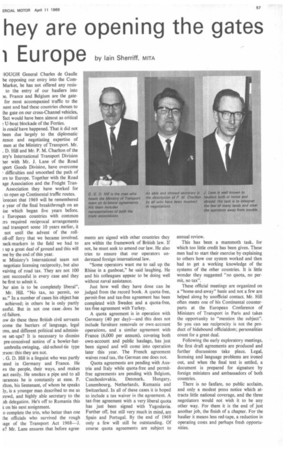hey are opening the gates
Page 59

If you've noticed an error in this article please click here to report it so we can fix it.
Europe by lain Sherriff, M ITA
-IOUGH General Charles de Gaulle be opposing our entry into the CornMarket, he has not offered any resis to the entry of our hauliers into )e. France and Belgium are the gate for most accompanied traffic to the nent and had these countries chosen to the gate on our cross-Channel vehicles, Tect would have been almost as critical U-boat blockade of the Forties.
is could have happened. That it did not been due largely to the diplomatic lence and negotiating expertise of men at the Ministry of Transport. Mr.
D. Hill and Mr. P. M. Charlton of the :try's International Transport Division aer with Mr. J. Lane of the Road iport Goods Division, have overcome , difficulties and smoothed the path of !rs to Europe. Together with the Road age Association and the Freight Tran
Association they have worked for to open up Continental traffic routes. brecast that 1969 will be remembered e year of the final breakthrough on an ise which began five years before.
European countries with common rs required reciprocal arrangements aad transport some 10 years earlier, it not until the advent of the rollall-off ferry that we became involved. mck-markers in the field we had to up a great deal of ground and this will me by the end of this year.
le Ministry's International team not negotiate licensing reciprocity, but also vaiving of road tax. They are not 100 :.ent successful in every case and they he first to admit it.
)ur aim is to be completely liberal", Mr. Hill. "No tax, no permit, no as." In a number of cases his object has achieved; in others he is only partly essful. But in not one case . does he rd failure.
ow do these three British civil servants come the barriers of language, legal ;ins, and different political and ad minisre set-ups? It is necessary to dismiss pre-conceived notion of a bowler-hatumbrella-swinging, old-school-tie type !non: this they are not.
. G. D. Hill is a linguist who was partly :ated in Germany and France. He vs the people, their ways, and makes act easily. He smokes a pipe and to all :arances he is constantly at ease. P. rlton, his lieutenant, of whom he speaks ly, is a younger man described to me as a-ewd, and highly able secretary to the sh delegation. He's off to Rumania this k on his next assignment.
o complete the trio, who better than one the officials who survived the rough age of the Transport Act 1968—J. e? Mr. Lane ensures that before agree ments are signed with other countries they are within the framework of British law. If not, he must seek to amend our law. He also tries to ensure that our operators understand foreign international law.
"Some operators want me to sail up the Rhine in a gunboat," he said laughing. He and his colleagues appear to be doing well without naval assistance.
Just how well they have done can be judged from the record book. A quota-free, permit-free and tax-free agreement has been completed with Sweden and a quota-free, tax-free agreement with Turkey.
A quota agreement is in operation with Germany (40 per day)—and this does not include furniture removals or own-account operations, and a similar agreement with France (6,000 per annum), covering both own-account and public haulage, has just been signed and will come into operation later this year. The French agreement waives road tax, the German one does not.
Quota agreements are pending with Austria and Italy while quota-free and permitfree agreements are pending with Belgium, Czechoslovakia, Denmark, Hungary, Luxembourg, Netherlands, Rumania and Switzerland. In all of these cases it is hoped to include a tax waiver in the agreement. A tax-free agreement with a very liberal quota has just been signed with Yugoslavia. Further off, but still very much in mind, are Spain and Portugal. By the end of 1969 only a few will still be outstanding. Of course quota agreements are subject to annual review.
This has been a mammoth task, for which too little credit has been given. These men had to start their exercise by explaining to others how our system worked and then had to get a working knowledge of the systems of the other countries. It is little wonder they suggested "no quota, no permit, no tax".
These official meetings are organized on a "home-and-away" basis and not a few are helped along by unofficial contact. Mr. Hill often meets one of his Continental counterparts at the European Conference of Ministers of Transport in Paris and takes the opportunity to "mention the subject". So you can see reciprocity is not the product of hidebound officialdom; personalities count for a great deal.
Following the early exploratory meetings, the first draft agreements are produced and further discussions take place. Legal, licensing and language problems are ironed out, and when the final text is settled, a document is prepared for signature by foreign ministers and ambassadors of both countries.
There is no fanfare, no public acclaim, and only a modest press notice which attracts little national coverage, and the three negotiators would not wish it to be any other way. For them it is the end of just another job, the finish of a chapter_ For the haulier it means less red-tape, a reduction in operating costs and perhaps fresh opportunities.












































































































































